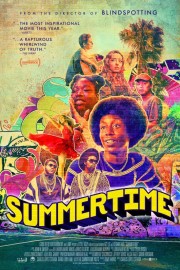Summertime
There’s something about “single day” movies that just feels interesting to me. Richard Linklater is basically the master of them, but director Carlos López Estrada (“Blindspotting,” “Raya and the Last Dragon”) buts a compelling spin here. We still get the idea of following various characters around town, but in this case, they are played by spoken word poets, each making their film debuts. The poets wrote the scenes and dialogue themselves, and Estrada uses his camera to bring them to life. It’s energetic and entertaining.
The film begins with a young woman singing about Venice, California on the pier until she runs into people trying to take a picture. We then see a group of three friends at a restaurant under new management, and a very new menu. We also follow two podcasters who come across rappers hoping for success, a young woman who’s obsessed with her ex-boyfriend, and another woman on a bus who puts a bigot in his place. So on and so forth, and some of these characters exist in one scene, some are followed throughout the film. It’s a diverse cast of characters, and we get poems about places, the passion someone will show in a Yelp review, the personal nature of art, and the struggle to figure out whom you are.
In a way, “Summertime” feels more relaxed than “Blindspotting” in its emotional core, but there are moments of tremendous power and feeling. Mila Cuda is the woman on the bus calling out the homophobia of a fellow passenger, while also proclaiming her own sexuality proudly. Tyris Winter may just want a cheeseburger, but his frustration is about the changing area around him, and how it has turned into something more gentrified and more geared for an upper class he is not in. And Marquehsa Babers absolutely slays as a young woman whom, after a terrible relationship, has a difficult time figuring out who she is; she actually finds herself meeting up with the woman obsessed with her ex, and their bond leads them to a moment where Marquehsa unloads every feeling she’s left pent up on her ex; it is the show-stopper moment of the film. Estrada’s film is about capturing life and its anxieties through the voice of a generation just getting started in life. Sometimes, they have some learning to go about themselves, along with how to relate to others. The ones we’re in the limo with at the end are exactly the ones we should be following; theirs are the faces and stories we most connect with, and the ending they get for this wild day is deeply satisfying to watch. “Summertime” may be loose, but it has a reason to be if it’s going to succeed in what it sets out to do.










